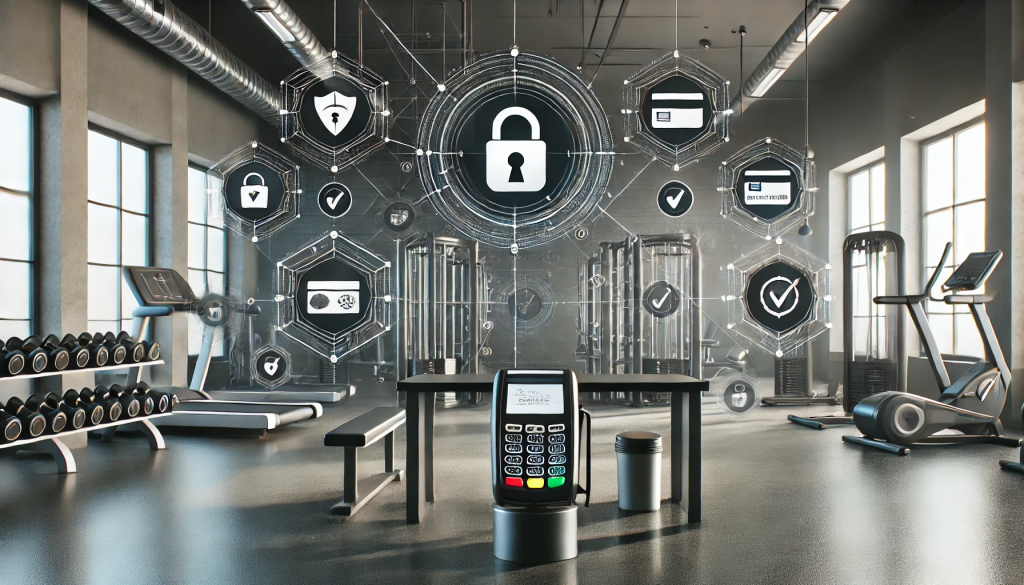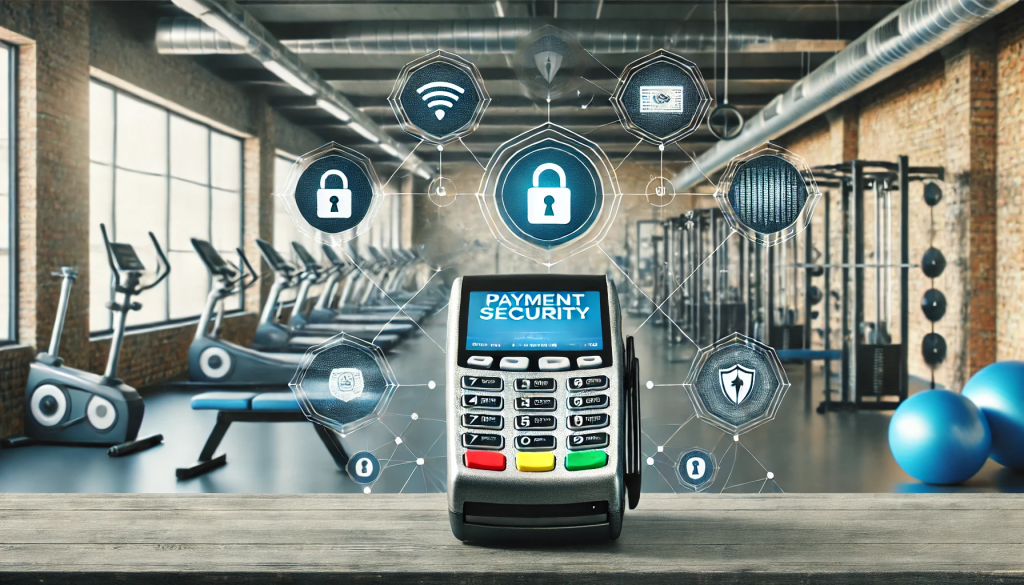
By dev October 28, 2024
In today’s digital era, payment security is a critical concern for businesses across all sectors, including the fitness industry. As fitness businesses increasingly embrace technology for online payments, memberships, and class registrations, the need for robust payment security becomes even more vital. Protecting customer data, avoiding fraud, and maintaining trust are essential to ensure a stable and thriving fitness business.
This comprehensive article will delve into the importance of payment security for fitness businesses, explore the risks of inadequate security, highlight best practices, and provide actionable strategies to safeguard sensitive financial data.
The Importance of Payment Security in Fitness Businesses

Protecting Customer Data and Building Trust
One of the primary reasons payment security is crucial for fitness businesses is the need to protect customer data. Gyms and fitness studios collect sensitive information, such as credit card details, billing addresses, and personal information, when processing payments. If this data is compromised, it can lead to identity theft, fraud, and reputational damage.
Enhancing Customer Confidence
A secure payment system instills confidence in customers, encouraging them to continue using your services without hesitation. Customers who trust a fitness business to handle their payments securely are more likely to remain loyal and recommend the facility to others.
Avoiding Financial Loss and Legal Consequences
Payment security breaches can have severe financial consequences for fitness businesses. Aside from potential financial losses due to fraud, businesses may face penalties for non-compliance with data protection laws and regulations. These financial repercussions can be significant, impacting a fitness business’s profitability.
Understanding Legal Compliance
Various data protection regulations, such as the Payment Card Industry Data Security Standard (PCI DSS) and General Data Protection Regulation (GDPR), require businesses to adhere to specific security measures. Non-compliance can result in heavy fines and legal liabilities, making it essential to prioritize payment security.
Common Risks Associated with Inadequate Payment Security

Data Breaches and Cyber Attacks
Data breaches and cyberattacks are among the most significant risks associated with inadequate payment security. Hackers often target fitness businesses to steal credit card information, personal details, and other sensitive data. These breaches can lead to financial loss, reputational damage, and a loss of customer trust.
Phishing Attacks
Phishing attacks involve fraudulent attempts to obtain sensitive information by disguising as a trustworthy entity. Fitness businesses are at risk of phishing attacks that target employees or customers, leading to compromised data if not addressed promptly.
Fraudulent Transactions
Fraudulent transactions can result from payment systems that lack security features like encryption and tokenization. Without adequate security, fitness businesses are vulnerable to chargebacks, unauthorized purchases, and other types of payment fraud.
The Impact of Chargebacks
Chargebacks occur when a customer disputes a payment, resulting in the reversal of the transaction. If a fitness business experiences a high volume of chargebacks due to fraud, it can lead to financial losses and higher payment processing fees.
Lack of PCI Compliance
Fitness businesses that fail to comply with PCI DSS standards risk severe penalties and fines. PCI compliance is designed to protect cardholder data, and failure to meet these requirements can lead to data breaches, legal consequences, and reputational damage.
Consequences of Non-Compliance
Non-compliance with PCI DSS standards can result in fines ranging from thousands to millions of dollars, depending on the severity of the breach. Fitness businesses that handle credit card payments must adhere to PCI requirements to avoid financial and legal repercussions.
Best Practices for Payment Security in Fitness Businesses

Implementing Secure Payment Gateways
A secure payment gateway is essential for processing transactions safely. It encrypts sensitive payment information, ensuring that data is transmitted securely between the customer, the business, and the bank. Choosing a reputable payment gateway provider that offers advanced security features is a key step in protecting customer data.
Look for Features Like Encryption and Tokenization
Encryption and tokenization are two critical security features to look for in a payment gateway. Encryption converts sensitive data into unreadable code, while tokenization replaces sensitive data with unique identifiers that cannot be exploited if intercepted.
Adopting Two-Factor Authentication (2FA)
Two-factor authentication (2FA) adds an extra layer of security to payment processing by requiring users to provide two forms of verification—such as a password and a one-time code sent to their phone. This minimizes the risk of unauthorized access to customer accounts and payment information.
Benefits of 2FA for Gyms
2FA can help prevent account takeovers and unauthorized transactions. It’s a simple yet effective way to enhance security, giving customers peace of mind when making payments through your fitness business’s platform.
Educating Staff on Payment Security
Employees play a crucial role in maintaining payment security, making it vital to educate staff on best practices for handling payments, detecting potential threats, and avoiding common security mistakes. Conduct regular training sessions to ensure staff members are up-to-date with the latest security protocols.
Training on Identifying Phishing Attempts
Employees should be trained to recognize phishing attempts and suspicious emails that could compromise sensitive data. Providing staff with guidelines on how to handle payment-related inquiries securely can help reduce the risk of internal security breaches.
Regularly Updating Software and Systems
Outdated software and systems are vulnerable to cyberattacks. Fitness businesses should regularly update their payment processing software, plugins, and security tools to ensure they are protected against the latest threats. Regular updates help fix bugs, patch vulnerabilities, and improve overall security.
Scheduling Routine Security Audits
Conduct routine security audits to identify potential vulnerabilities and assess the effectiveness of existing security measures. Regular audits help fitness businesses stay proactive in maintaining a secure payment environment.
Key Payment Security Features for Fitness Businesses

Tokenization and Encryption
Tokenization and encryption are two essential security features for protecting payment data. Tokenization replaces sensitive information with unique tokens, while encryption converts data into unreadable code. Together, these features safeguard customer information from potential cyber threats.
How Tokenization Works
Tokenization creates a unique token for each transaction, which replaces sensitive payment information. Even if intercepted, the token is meaningless to hackers without the original data, reducing the risk of data theft.
PCI DSS Compliance
Compliance with PCI DSS standards is non-negotiable for fitness businesses that handle credit card payments. These standards outline security protocols that protect cardholder data, including encryption, data storage guidelines, and access controls.
Steps to Achieve PCI Compliance
To achieve PCI compliance, fitness businesses should work with a payment processor that meets PCI requirements, conduct regular security assessments, and implement necessary controls to protect payment data.
Secure Socket Layer (SSL) Certificates
SSL certificates ensure that online transactions are encrypted and secure. A website with SSL encryption protects payment data from being intercepted during transmission, providing a secure environment for online payments and registrations.
The Role of SSL in Building Trust
Websites with SSL certificates display a padlock icon in the browser’s address bar, indicating that the connection is secure. This helps build trust with customers, encouraging them to complete transactions without hesitation.
Strategies to Maintain Payment Security in Fitness Businesses
Use a Reputable Payment Processor
Selecting a reputable payment processor is one of the most effective strategies for maintaining payment security. Choose a provider with a proven track record of secure transactions, strong encryption protocols, and compliance with industry standards.
Features to Look for in a Payment Processor
Look for payment processors that offer fraud detection tools, chargeback management, PCI compliance, and multi-currency support. These features ensure secure and seamless payment processing for fitness businesses.
Regularly Monitor Transactions
Monitoring transactions regularly helps detect unusual activity or potential fraud. Implement tools that allow you to set alerts for suspicious transactions and track payment trends. Early detection can prevent financial losses and mitigate damage.
The Importance of Fraud Detection Tools
Fraud detection tools use algorithms to identify suspicious patterns, such as multiple failed login attempts or unusual purchase locations. These tools help prevent fraud and ensure secure payment processing.
Implement Strong Password Policies
Strong password policies are a simple yet effective way to protect customer accounts. Require customers and employees to create complex passwords and change them regularly. Consider implementing password managers for added security.
Encouraging Customers to Use Strong Passwords
Encourage customers to use unique and strong passwords for their accounts. Educate them about the risks of using simple or repeated passwords and the benefits of using password managers.
Conduct Regular Security Audits
Regular security audits allow fitness businesses to assess the effectiveness of their payment security measures. Work with cybersecurity experts to identify weaknesses and vulnerabilities that need to be addressed.
Benefits of Professional Security Audits
Professional security audits provide an in-depth analysis of your payment systems and offer recommendations for improving security. They help ensure that your fitness business remains compliant and secure.
FAQs
Q1: What is PCI compliance, and why is it important for fitness businesses?
PCI compliance refers to adhering to Payment Card Industry Data Security Standards, which protect cardholder data during transactions. It is essential for fitness businesses to avoid legal penalties, protect customer information, and maintain trust.
Q2: How can I protect my fitness business from fraudulent transactions?
Use a secure payment gateway with encryption, implement two-factor authentication, train employees to recognize fraud, and regularly monitor transactions for suspicious activity. Consider using fraud detection tools for early detection.
Q3: What should I look for in a payment processor for my fitness business?
Look for features like PCI compliance, encryption, tokenization, fraud detection tools, automated billing, and integration with your gym management software. A user-friendly interface and reliable customer support are also crucial.
Q4: How often should I update my payment processing software?
You should update your payment processing software regularly, ideally whenever new updates or security patches are released. This ensures that your system is protected against the latest threats and vulnerabilities.
Q5: What are some best practices for training staff on payment security?
Train staff to recognize phishing attempts, handle payment data securely, and use secure communication methods. Regularly update training materials to reflect new threats and changes in payment security protocols.